TRENDS AND OPPORTUNITIES IN GLOBAL PHILANTHROPY
Last month ”WTCA Meridian” featured the launch of the WTCA Foundation’s new programming (see November’s WTCA Meridian for more). and since the end of the year is traditionally seen as the season of giving, we asked Sunil Oommen, Founder of Oommen Consulting, to identify some trends and opportunities in global philanthropy.
Simply defined, philanthropy means the love of humanity. And just as varied and complex as human beings and culture, philanthropic endeavors take many different forms around the world. From large private foundations, to celebrity philanthropists, corporate social responsibility programs, and remittances by immigrant workers to their home countries, one common thread is clear: human beings have an ingrained instinct to give back.
Technological advances and transnational learning have produced a number of trends in global philanthropy, and as a result, interesting opportunities for WTCA Members to make an impact, in addition to the work of its own foundation.
The Rise of Private Foundations
There has been a steep increase in the number of private foundations around the world. This global trend started for two reasons: growing wealth across the planet, and governments’ desire to foster private giving to complement their own budgets and duties for public services.
According to the 2018 Global Landscape of Philanthropy report by the Worldwide Initiatives for Grantmaker Support (WINGS), there are now more foundations in Europe than in the United States, most of which are very young. For example, the number of French foundations more than doubled between 2001 and 2014, and half of Swiss foundations are less than 20 years old. And this trend doesn’t stop at Europe’s edge: In China, approximately 60-65 percent of foundations are now private. Prior to a 2004 regulation that made this possible, most were public and government-run. Meanwhile, technology industry billionaires are creating their own foundations in India, and Russia has seen a growth in foundations that specialize in raising funds.
As these foundations emerge and mature, many might be seeking a competitive advantage by establishing relationships with commercial, civic, and governmental entities to make more of an impact. Given their reach and ambition, a connection to WTCA members and its foundation could be a natural and mutually beneficial fit.
The Rise of Alternative Philanthropic Investments
There has also been growing popularity in alternative ways to use capital to make social impact. Some of the more popular concepts in this space are impact investing, venture philanthropy, socially responsible investing, and program-related investments. Though each has its own distinctions, all are investments made with the intention to generate a measurable and beneficial impact alongside a financial return.
The Global Impact Investing Network estimated that $228 billion was invested in impact-generating investments in 2018, double the prior-year estimate. And the trend is global. While impact investors are predominantly located in North America and Europe, a majority of impact funds are being invested in the developing world. Expect this trend to grow as investors report better performance and alignment on financial and impact returns, and social movements challenge institutions to consider how to make a difference in confronting society’s problems.
While not quite “mainstream” yet, according to a 2018 survey by American Century Investments, 24 percent of respondents said they were very or somewhat familiar with the concept of impact investing, an increase from 20 percent in 2016. Among those most familiar? No surprise: millennials at 32 percent. Moreover, 60 percent of millennials expressed that making an impact on society was an important factor in their investment decision-making.
In the face of greater world challenges and strains on governments to provide what their publics need, the private business sector has an opportunity to make a difference on social and environmental issues while growing the bottom-line and establishing long-term, positive relationships with desired target markets, not the least of which includes the ever more powerful millennial generation.
The Rise of Innovation
Despite the growth in foundations and philanthropy by individuals around the world (with individuals giving far more than institutions in almost every country), most of the problems that donors seek to address still exist. In some cases, they have worsened. For example, the number of forcibly displaced peoples and refugees around the world is the greatest it has been since World War II. In places like the United States where philanthropy is considered an exalted part of the national culture, some societal ills, such as homelessness and hunger, are growing worse. Innovation is seen as an important tool to reverse these trends.
For example, the Case Foundation founded the Be Fearless campaign to inspire grantmakers and nongovernmental organizations (NGOs) to be bolder and risk failure by experimenting with new ways to make a greater impact on the problems they aim to solve. Even nonprofit industry conferences have transformed entirely to spark new ways of thinking. Upswell, a new summit that has people and ideas collide and brew in energetic and mind-expanding encounters, was created in 2018 to replace U.S.-based NGO Independent Sector’s traditional annual conference. Expect more talk about innovation as once-bedrock sociopolitical institutions continue to transform, and the technology industry explores ways to leverage its powerful platforms to better society.
Just as our businesses and trade are intertwined the world over, so are our social issues. WTCA members have a tremendous opportunity to leverage their international connections and expertise to encourage bolder action by the growing number of foundations around the world, and explore business-friendly ways to invest in social impact.
Sunil Oommen is the President of Oommen Consulting, a boutique fundraising firm that serves corporations and nongovernmental organizations. Please visit www.suniloommen.com to learn more.

